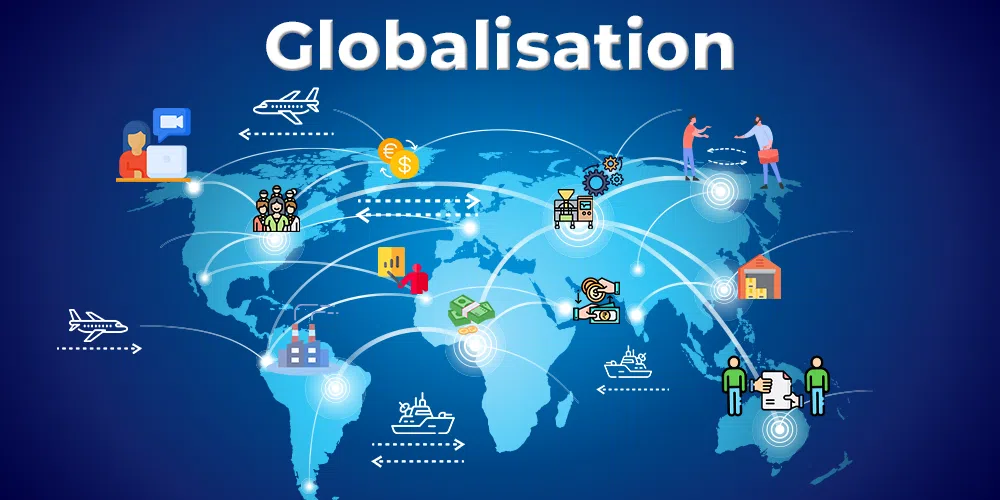Globalisation
Globalisation is the chapter taken from the Political Science for Class XII CBSE covering the complete syllabus of the Class which is very beneficial for appearing in the Board Exams
Globalisation
Globalisation
is the flow of idea ,Capital, moving from one part country to another part of the world and commodities being traded across the border and people moving across the border for the search of livelihood . Itleads to world wide interconnectedness which is created and sustained as the outcome of these constant flow.
Causes of Globalisation:
It is caused by my factors such technology is an indispensable element which is the most important cause of globalisation.
Invention of printing, microchips, telephone and internet has revolutionized communication between different parts of the world.
Manifestations of Globalization :
a) Political Consequences : Globalisation decline the state capacity because the ability of government to perform the task has been reduced . The old welfare state is giving away the political philosophy of minimum interference in which state perform certain functions such as maintenance. of law and order and security of citizens
Market becomes a prime determinant to settle down social and economic priorities in the place of welfare as there is increase in the number of MNC’s so the role of government has been reduce to take decisions of their own.
b) Economic Consequences : It involves the greater economic flow among the countries through economic globalisation because it has increased the trade of commodities among the countries . It draws our attention to the role of international institutions like WTO and IMF, This has reduced the restrictions over imports and movement of the capital which causes free flow of trade.In the other words the investors of rich counties can invest to other countries and developing countries.
c)Cultural Consequences i) Cultural Homogenization is important aspect of Cultural globalisation .It is the rise of uniform culture or different cultural practices into one common practice It means imposition of western vulture on the rest of the world ii)Cultural Heterogenization is the aspect of Globalisation which generates an opposite effect this leads toeach culture becoming more different and distinctive in nature.
Debates on Globalisation:
a) Economic Aspects : It has led to the different opinions in the world about the social justice that has been withdrawal from certain aspects which only benefits the small section of population. Most of the movement felt social Safety nets which are insufficient all over the world they believed that forced It must be discontinued because it ruin the weak countries economically.
Economic :The states are in Favour to generate greater economic growth and benefit large section of society of the country. Some Moderate scholar believe that globalisation provides challenges which must be handled properly.
b) Political Aspects :According to some scholars that Globalisation is forceful process which is likely to be reversed. As Developing Countries have the ability to influence the world trend in limited sense. The challenges for developing countries and regions to find their own ways to influence the overall trends .
Some people think that government in developing countries are required to establish rules that include the openness, transparency and credibility in the government action . There must not be any bureaucratic interference, discretionary regulations and corruption. If this mechanism be developed will help in efficient working of market forces.
India and Globalisation :
Globalisation has taken place at different parts of world at different times .The Flow of wealth, Commodities , Ideas and people can be traced back several countries in India. Protectionism generated it’s own problem the advancement has been made in certain fields but health ,housing and primary education were neglected and India had very low rate of economic growth.
Globalisation has affected the Indian Economically, Socially and Culturally. India adopted The New Economic Policy 1991 and removed most of the restrictions on imports which encouraged the investment in India. FDI increased the production of goods and services and also enhance the foreign exchange.
After the adoption of Globalisation European and US Culture spread in India very rapidly with respect to food and dressing style. .Joint Family System is covering into Nuclear Families. Information and Space Technology has improved in great extent. India is participating in trade and commerce with the other countries
India resistance to globalisation has come from various fields like Trade Union of Industrial Work Force and many Social Movements. It is very early to assess the benefits of the same.
Resistance to Globalisation:
Some Scholars think that cotemporary Globalisation represent the phase of Global capital in which Rich is getting Richer and Poor is getting poorer.It is fear of weaking the State because developing Countries want to be self reliant and protectionism in the region of Financial system. The movements of anti globalisation also participate in global networking.. In WTO ministerial meeting it has been alleged about the unfair practices by economically powerful countries . Interest of Developing countries are always ignored in the evolving of Global system.
World Social Forum is a global platform in which human rights activists, environmentalist , labour youth and women activists opposed to neo- liberal globalisation.
India’s role i in this field is also the same at different quarters . Many of the Political parties and Social forum has een expressing their objection to economic liberalisation. It has come from political rightstaking the shape of objecting specially to various cultural impacts such as Foreign TV Channels, Valentine’s day , rose day etc.
Follow Us : FACE BOOK Instagram
Read More: International Organizations
